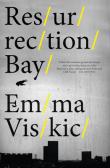 4388025898372305611.jpg
4388025898372305611.jpg
 4388025898372305611.jpg
4388025898372305611.jpg
'Caleb Zelic, profoundly deaf since early childhood, has always lived on the outside - watching, picking up telltale signs people hide in a smile, a cough, a kiss. When a childhood friend is murdered, a sense of guilt and a determination to prove his own innocence sends Caleb on a hunt for the killer. But he can’t do it alone. Caleb and his troubled friend Frankie, an ex-cop, start with one clue: Scott, the last word the murder victim texted to Caleb. But Scott is always one step ahead.
'This gripping, original and fast-paced crime thriller is set between a big city and a small coastal town, Resurrection Bay, where Caleb is forced to confront painful memories. Caleb is a memorable protagonist who refuses to let his deafness limit his opportunities, or his participation in the investigation. But does his persistence border on stubbornness? And at what cost? As he delves deeper into the investigation Caleb uncovers unwelcome truths about his murdered friend – and himself.'
Source: Publisher's blurb.
Writing Disability in Australia:
| Type of disability | Profound deafness. |
| Type of character | Primary. |
| Point of view | Third person. |
'The cultural and commercial operations of the publishing industry have been dramatically reshaped by digital technologies, yet little is known about how these effects are differentiated across sectors of the industry. This article analyses data about the production of Australian-authored fantasy, romance and crime fiction titles to explore the specific publishing ecosystems of different genres and the roles played by multinational, small press and self-publishing in each. First, we show that there has been across-the-board growth in each genre and for each type of publisher. Second, we argue that multinational publishing activity in these genres has been characterized by broad stability, punctuated by experimentation with genre-specific imprints for romance and fantasy titles. Third, we find that small presses make diverse contributions to genre ecosystems, able to both activate prestige and experiment with formats. Finally, we note the immense growth in self-publishing, particularly in romance, and argue that self-publishing now operates in tandem with traditional publishing to create hybridized publishing ecosystems - with greater potential to transform the traditional publishing model than e-books.' (Publication abstract)
'Australian author Viskic's Resurrection Bay (Pushkin Vertigo, Apr.) marks the debut of deaf detective Caleb Zelic. Why make Caleb deaf? I'm drawn to writing crime fiction because it's a compelling way to explore human motivations.' (Publication abstract)
'For her first novel Emma Viskic presents us with an intricately plotted mystery thriller.'
 Resurrection Bay by Emma Viskic
Melbourne
:
CAE Book Group
,
2016
12215075
2016
single work
criticism
Resurrection Bay by Emma Viskic
Melbourne
:
CAE Book Group
,
2016
12215075
2016
single work
criticism
'Australian author Viskic's Resurrection Bay (Pushkin Vertigo, Apr.) marks the debut of deaf detective Caleb Zelic. Why make Caleb deaf? I'm drawn to writing crime fiction because it's a compelling way to explore human motivations.' (Publication abstract)
'The cultural and commercial operations of the publishing industry have been dramatically reshaped by digital technologies, yet little is known about how these effects are differentiated across sectors of the industry. This article analyses data about the production of Australian-authored fantasy, romance and crime fiction titles to explore the specific publishing ecosystems of different genres and the roles played by multinational, small press and self-publishing in each. First, we show that there has been across-the-board growth in each genre and for each type of publisher. Second, we argue that multinational publishing activity in these genres has been characterized by broad stability, punctuated by experimentation with genre-specific imprints for romance and fantasy titles. Third, we find that small presses make diverse contributions to genre ecosystems, able to both activate prestige and experiment with formats. Finally, we note the immense growth in self-publishing, particularly in romance, and argue that self-publishing now operates in tandem with traditional publishing to create hybridized publishing ecosystems - with greater potential to transform the traditional publishing model than e-books.' (Publication abstract)